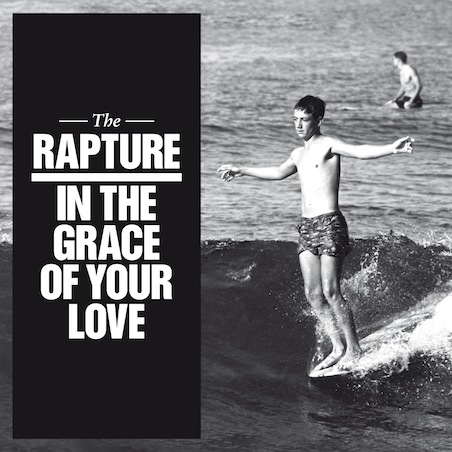As was the case with 2006’s Pieces Of The People We Love, In The Grace Of Your Love, the third full-length album from seminal dance-punk outfit The Rapture, was doubted to ever exist at all. A group that has consistent rumors of breakups, tours with irregularity, and, it seems, demands a minimum of three years to craft a new release (see 1999’s mini album Mirror, 2003’s breakthrough Echoes, and the aforementioned albums), there is little holding The Rapture together. Members come and go, most recently with the departure of bassist Matt Safer, as do record labels, which change from release to release. But, none of this has ever made a problem for their sound, which expanded from the impassioned sloppiness of Echoes to a more confident, composed, and still quite affecting flex on Pieces Of The People We Love. At least, none of that has ever been a problem until now.
In The Grace Of Your Love is a painful experiment in spaghetti tossing, where no matter how hard the band seems to be trying (and in the years this record took to create, there was undoubtably plenty of effort), nothing sticks in the way that the band had so effortlessly-seeming been able to accomplish in the past. For once, the instability of the band is audible. Opening with four songs that sound like they could be from different albums, In The Grace Of You Love never gets its feet under it to build any momentum. “Sail Away” opens strong enough, providing an engrossing, if one-note, display of what the 2011 incarnation of The Rapture do well – all-hands-on-deck party starters. Unfortunately, the track ends with a minute-long jazz saxophone fade-out that allows the listener to lose any good graces that had been bestowed from the album’s initial track.
Following this moment with the insufferable “Miss You” sinks the album. “Miss You” employs a strikingly similar beat to the second track from the last Rapture record, causing worry that the band has truly run out of ideas, but that is the least of its problems – is there anything worse than a chorus that whines “I miss you?” But, as pussified as this declaration seems, the chorus is led into with lyrics about “broken faces,” which are utterly unbelievable considering just how the song sounds, and how it is followed by the most simplistic and elementary of teenage emotions – “I miss you.” It is 2011. You are an artist. If you can’t find a better way to express missing someone than by simply stating that “I miss you,” than you have no business writing lyrics. I’m also looking at you, Foster The People.
It would be one thing if “Miss You” was In The Grace Of Your Love‘s only cringe worthy moment, but it is only the tip of the iceberg. “Blue Bird” inexplicably tries to put a new spin on dance-punk, by making it undanceable and employing a higher-than-high falsetto verse. It sounds like Cut Copy in double-time, and it falls horribly flat. “Come Back To Me” is the first song I have ever heard that contains both the original tune and the remix of that tune in the span of a single track. “How Deep Is Your Love?” bites its melody from the fucking “Thong Song.” And closer “It Takes Time To Be A Man” comes out of left field to show the soulful side of vocalist Luke Jenner with a 60s Motown-inspired slow-jam, sounding as out of place as you might imagine.
These, combined with the meta-problems (sickeningly slick production, or, when not, fake-DIY-sounding drivel), force the listener to even call into question the album’s few triumphs. The title-track showcases Jenner’s vocals at their best, sounding heartbreakingly thin and fragile, as if they were lucky to have such a solid guitar riff and keyboard line to hold them together, or else the voice might tear at the seams. The album also houses one true banger, and not the infectious “How Deep Is Your Love?,” which becomes impossible to love after the “Thong Song” revelation. No, it is “Children” where The Rapture’s new album comes closest to finding a voice, again showing a gravitation towards sounds that Cut Copy, Passion Pit, and Foster The People are popularizing. On “Children,” The Rapture show that they are as worthy of pupils as they have been for the last decade as teachers. But, unfortunately, they still have a lot to learn.

